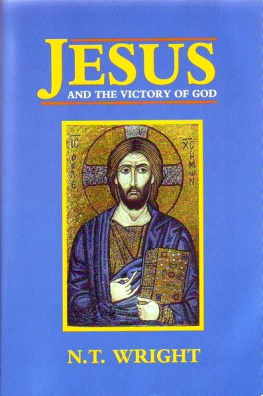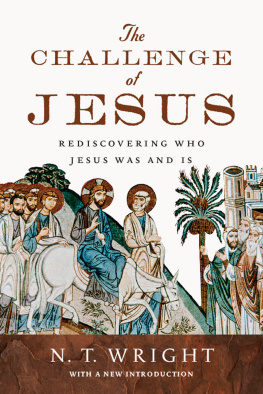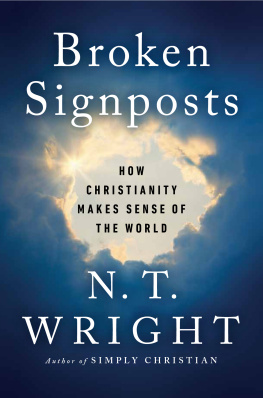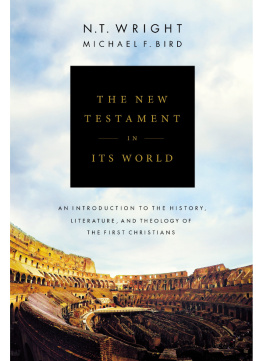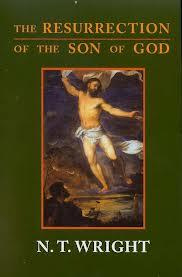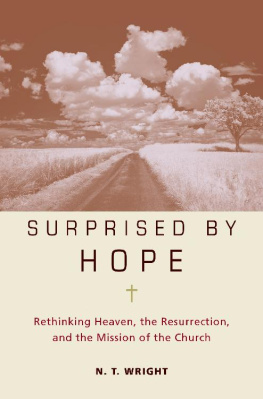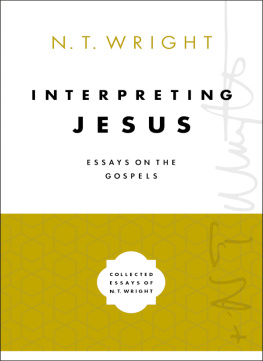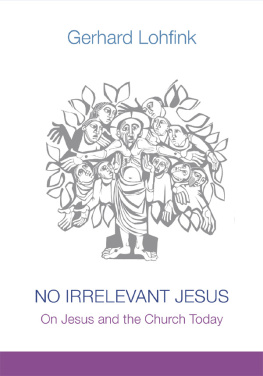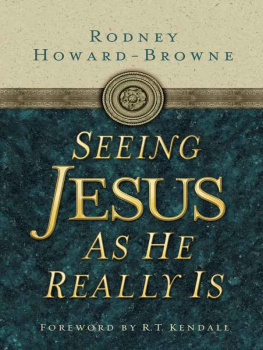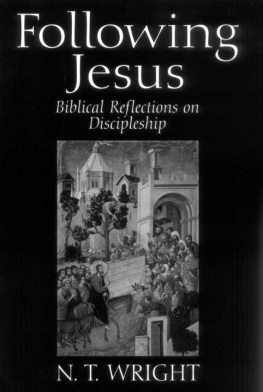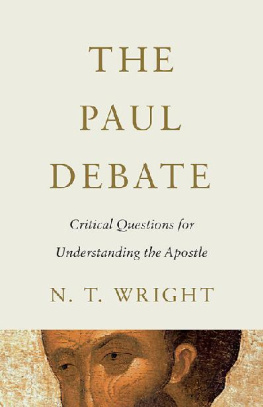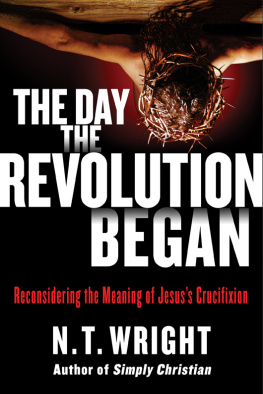CHRISTIAN ORIGINS AND THE QUESTION OF GOD
Volume Two
J ESUS
AND THE
VICTORY OF GOD
N. T. Wright

First published in Great Britain
Society for Promoting Christian Knowledge
36 Causton Street
London SW1P 4ST
Copyright Nicholas Thomas Wright 1996
All rights reserved. No part of this book may be reproduced or transmitted in any form or by any means, electronic or mechanical, including photocopying, recording, or by any information storage and retrieval system, without permission in writing from the publisher.
SPCK does not necessarily endorse the individual views contained in its publications.
British Library Cataloguing-in-Publication Data
A catalogue record for this book is available from the British Library
ISBN-13: 978-0-281-04717-8; ISBN-10: 0-281-04717-0 (paper)
ISBN-13: 978-0-281-05053-6; ISBN-10: 0-281-05053-8 (cased)
for M.E.A.W.
CONTENTS
I
The historian of the first century cannot shrink from the question of Jesus. That was the conclusion I came to near the end of the first volume in this series, on whose shoulders the present work rests all its weight. I argued that the study of first-century Judaism and first-century Christianity forces us to raise certain specific questions about Jesus: who was he? what were his aims? why did he die? and why did early Christianity begin in the way that it did? The present book is my attempt to answer the first three of these questions, and to point towards an answer to the fourth.
I am still sometimes embarrassed when people ask me what the present book is about, and I say Jesus. It seems pretentious. How can anyone have anything new to say about Jesus without being a crank or a maverick, or, worse, making Jesus himself into one? I have come to believe that these questions about Jesus are vital, central, and as yet not fully answered ; and that a clearly worked out historical method, and a fresh reading of first-century Judaism and Christianity, will point us in the right direction.
Questions about Jesus possess, I believe, enormous intrinsic interest, no matter what the standpoint of the questioner. They are worth asking, whether one is a historian, a philosopher, a theologian, a cultural critic, or simply someone interested in the human condition with all its joys and sorrows, its high and low points, its perils and possibilities. But there is no point pretending that such questions are not also of very specific relevance for those who profess some sort of Christian faith. A recent survey of the Church of England, discussing the manifold reasons why people do not go to church, comments wryly:
Part of the reason is simply a lack of belief that the death of Christ was the turning-point of history It all seems less and less likely to be true, the more you discover about those maniacs in the first century who were expecting a Messiah and getting ready for the end of the world.
Unless one can at least address this question, one might as well give up and go home. The same point is made from a different angle by the veteran philosopher of religion John Hick. What you say about Jesus affects your entire worldview. If you see Jesus differently, everything changes. Turn this small rudder, and the whole ship will change tack. To put it bluntly: what if the maniacs turned out to be right?
There are some, of course, who would rather not mix up history and faith. I shall have quite a bit to say about this dilemma as the book progresses. For the moment it is enough to say that I come to this work as a practising historian and as a practising Christian, and that my experience of both worlds suggeststo put it no strongerthat neither of them need feel compromised by intimate association with the other.
II
In one sense, I have been working on this book on and off for most of my life. Serious thought began, however, when I was invited in 1978 to give a lecture in Cambridge on The Gospel in the Gospels. The topic was not just impossibly vast; I did not understand it. I had no real answer, then, to the question of how Jesus whole life, not just his death on the cross in isolation, was somehow gospel. Fifteen subsequent years of teaching in Cambridge, Montreal and Oxford have convinced me that this question, and the detailed sub-questions which go with it, are worth asking; and that answers are available, if we keep to the high road of historical enquiry and refuse to be sidetracked into the superficially more attractive country lanes of much modern gospel study, where we are often brought to a halt by the hermeneutical equivalent of a hay-waggon or a herd of sheep.
Further stimulus to persevere with the historical task has come from the new wave of scholarly Jesus-studies which I describe in Part ) have forced me to articulate much more clearly than I would otherwise have had to do why I disagree with them, and I am genuinely grateful for this, as also for emphases and nuances which they rightly highlight and which I and others might otherwise have missed.
All writers about Jesus have to live with the old jibe that the historian is inclined to see his or her own face at the bottom of a deep well and mistake it for the face of Jesus. I have to say that the face I describe in this book always was, and still remains, disturbingly unlike my own. I have not tried to make Jesus in the image either of a university lecturer or of an Anglican priest; he continues to challenge and disturb both of those worlds and those who live in them, myself included. This does not mean, of course, that the portrait is thereby validated; only that it is not a self-portrait. I wish it were.
This book argues, in fact, for conclusions which were quite simply not in view from the start of the exercise. Nor were they worked out even early on in the process of teaching, or even when, thinking I had settled them, I began to write. At every stage I found myself coming face to face with historical problems, and (since I could not abandon my basic. Christian beliefs without becoming a totally different person) with the question of how, if at all, history and belief might cohere. In the process, my view of Jesus within his historical context has substantially developed and changed. So, inevitably, has my understanding of what Christianity itself actually is, and the nature of my belief in it. This process, which continues, is neither easy nor comfortable. (Again, this does not validate the conclusions, but merely refutes the suggestion that they were in view from the start.)
The book inevitably carries overtones of current situations in the land where the story of Jesus is set, where I was staying in 1989 when I wrote the first draft. From my room I could hear distant gunfire; on the street one could sense Jewish anxiety and Palestinian frustration in about equal measure. To have a riot dispersed with tear gas outside my window while I was writing the chapter on the cross gave me, to say the least, food for thought. To watch the events of late 1995 and early 1996 while rewriting it for the last time was no less painful. The multiple ambiguities and tensions of that beautiful country are now forever bound up in my mind with the subject-matter of the book itself, as is perhaps appropriate. If what I write could help in any way towards the establishment of justice and peace there, or indeed anywhere else, I would be deeply grateful.
III
Seven small points, and one not so small. First, I have continued to use the lower case g in god, and to refer to Jesus as Jesus rather than Christ. The reasons for this are explained in the Preface of NTPG (xivf.).
Second, I have taken it for granted that Jesus of Nazareth existed. Some writers feel a need to justify this assumption at length against people who try from time to time to deny it. It would be easier, frankly, to believe that Tiberius Caesar, Jesus contemporary, was a figment of the imagination than to believe that there never was such a person as Jesus. Those who persist in denying this obvious point will probably not want to read a book like this anyway.
Next page
